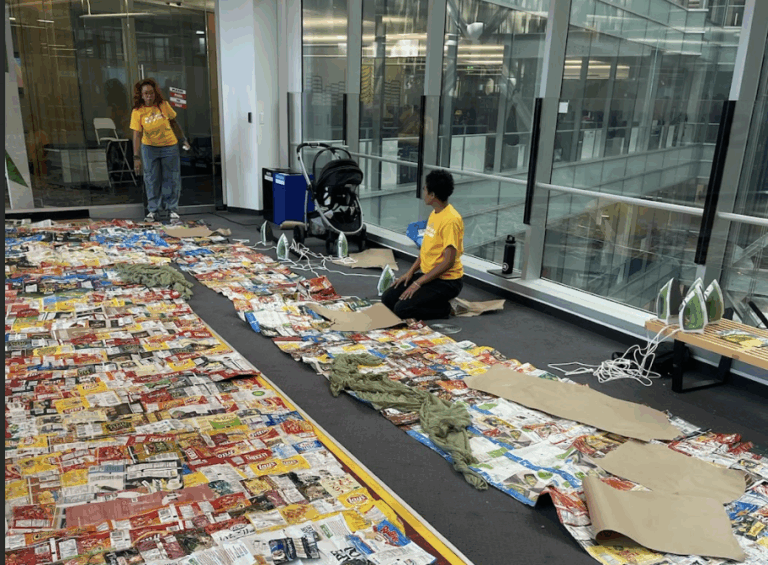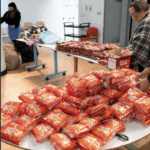
- Kim Kisner
- Business
- 07/01/2025
Tackling Waste and Housing Insecurity in Southeast Michigan

The Chip Bag Project, based in Detroit, is a sustainability initiative that upcycles hard-to-recycle snack packaging — particularly chip bags — into insulated sleeping bags for individuals experiencing homelessness. Founded by Eradajere Oleita, the project addresses both environmental waste and housing insecurity by transforming materials like Mylar into practical, thermally efficient solutions. In June, Oleita was among Trelllis’s 30 Under 30, its annual recognition of the brightest young stars among sustainability professionals.
SBN Detroit interviewed Oleita about the origins of the project, the process of upcycling waste into resources, and the intersection of environmental justice and social equity in Detroit.

Q: What first inspired you to create The Chip Bag Project—and why chip bags specifically?
A: It started during the COVID lockdown. I came across a video of someone transforming snack wrappers into blankets, and it sparked something. At that time, I had already been teaching sustainability in Detroit schools, often explaining what can and can’t be recycled—and why. Chip bags always came up as a frustrating example.
But when I realized the material — Mylar — is the same used in emergency blankets, it came together for me. The material is reflective, lightweight, waterproof, and retains body heat. So instead of trying to recycle chip bags through a broken system, why not repurpose them into something useful? Turning them into sleeping bags made practical sense.
Q: Can you walk us through the upcycling process – how do chip bags become thermal sleeping bags?
A: Once we receive the materials—chip bags, coffee bags, bread bags—we sort and wash them. Some are donated locally, others are mailed in from around the country. After cleaning, we cut the bags and use a thermal process to fuse them into sheets. Then we add insulation, often repurposed from Blue Apron food packaging, and assemble the final product into a sleeping bag.
It’s a full-circle upcycling system. Every component, from the outer layer to the cushioning, is reused.
Q: What were some of the biggest technical or logistical challenges you’ve faced?
A: The biggest challenge was inventing a process that didn’t exist. We had to figure out how to sanitize the materials, fuse them safely, and do it all in a way that aligned with our sustainability values.
As we’ve grown, space has become a major issue. We’ve collected over 2.5 million pounds of material to date, but we still don’t have a dedicated physical facility, but we are working on that.
We’re also focused on ensuring that all of our processes are sustainable. We are constantly asking ourselves, “How much energy are we using? Can we offset it? Are we scaling in a truly sustainable way?”
Q: How do you source materials and volunteers? Has the community been supportive?
A: Absolutely. I don’t even eat chips! So when I first started, I needed help collecting bags. I put the call out on social media, and the community responded immediately. From there, partnerships developed – with schools, festivals, companies, and individuals. The entire model is rooted in collective action.
Volunteers also are critical. They help with everything from washing bags to assembling kits. The people who support this work have truly shaped its direction.

Q: The project sits at the intersection of environmental sustainability and social justice. How do you see those two issues as connected?
A: Environmental justice and social justice are two sides of the same coin. For example, pollution becomes a public health crisis. Contaminated water becomes a housing or equity issue. Climate change displaces people. In Detroit, we’ve seen it all — air and water quality problems, housing shortages, flooding from extreme rain. This city is at the epicenter of so many intersecting challenges.
Detroit is also a place of innovation and resilience. That’s why it was so important to start the project here. It serves as both a proving ground and a case study for what’s possible when we combine environmental action with community-centered design.
Q: What impact have you seen so far?
A: The response has been incredible. We’ve distributed thousands of winter kits that include our thermal bags, gloves, socks, and hygiene supplies. Each year during our warming tent drives, we also listen. The unhoused community has helped shape our product — suggesting more insulation, more comfort. It’s a conversation.
There’s also a behavioral shift happening. People are saving Mylar bags at home. Schools are integrating sustainability into their classrooms. Even corporations are reaching out to partner with us. This year we received a grant from EGLE to install chip bag collection kiosks in grocery stores across Southeast Michigan.
Q: What do you wish more people understood about upcycling — and the connection between environmentalism and equity?
A: That it’s accessible. Upcycling isn’t a high-concept lifestyle — it’s what so many families already do out of necessity. Growing up in different economic environments, I saw people reuse grocery bags, repurpose clothes, and pass things down. That’s upcycling.
If we hold ourselves accountable for even small actions – reusing, repurposing, buying differently – we can reduce our waste footprint and shift larger systems. Equity and environmentalism go hand in hand when we center the everyday choices people make in their homes.
Q: What’s next for The Chip Bag Project? Are you planning to scale or expand your reach?
A: Yes. We recently received a grant to install those chip bag kiosks I mentioned. For a while, we had to stop collecting because we simply ran out of room. Now, we’re looking for a permanent facility to serve as both a workspace and a storage hub.

We’re also launching a school-year program and working to get our curriculum certified for broader use across the country. Our five-year anniversary is coming up, and we’re planning to use that moment to raise funds and build even more momentum.
This summer, we’re continuing our monthly neighborhood cleanups — teaching plastic education and giving back. We also do corporate team-building events, like the one with StockX on 313 Day, where employees helped assemble sleeping bags. We’re always looking to partner with companies who want to create meaningful impact.
Be sure to subscribe to our newsletter for regular updates on sustainable business practices in and around Detroit.
Kim Kisner
- All
- Business
- Community
- Education
- Events

Unique Monique Scented Candles, a Detroit-based business founded by Monique Bounds., aims to produce candles and household products with clean ingredients and local supply chains. What began as a personal hobby during college has evolved into a full-time venture producing coconut oil and soy-based candles made with essential oils and locally sourced materials. SBN Detroit interviewed Bounds about launching a sustainable product line, sourcing challenges in Michigan, and...

Eastern Market Partnership, in collaboration with the City of Detroit’s Office of Sustainability Urban Agriculture Division, has announced $240,000 in grant funding to support Detroit-based farmers and farmer collectives. The grants will advance food access, climate education, sustainable land use, and economic opportunity, with priority given to Black- and Indigenous-led farms, youth-led initiatives, and projects rooted in historically disinvested neighborhoods. The recipients – ranging from cooperatives and community...

Citizen Robotics is a Detroit-based nonprofit that advances the use of robotics and digital manufacturing in residential construction, focusing on improving productivity, sustainability, and long-term affordability. Best known for its early work in 3D-printed housing, it explores how alternative construction methods and new financial models can reduce material waste, lower lifetime operating costs, and enhance the resilience of homes. SBN Detroit interviewed Tom Woodman, founder and president of...







